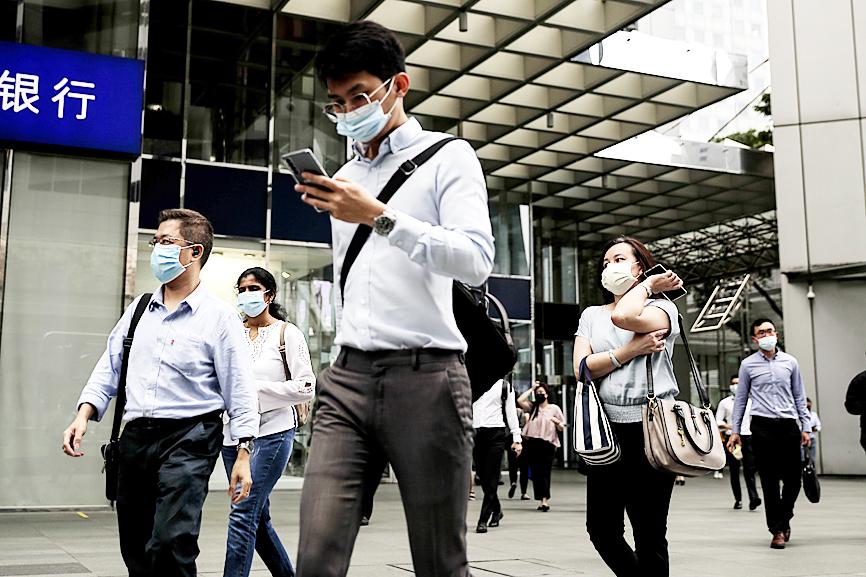Less crowded trading floors, facial recognition systems and split work areas could all become routine for bankers in Singapore as the city-state readies for office life in a post-COVID-19 world.
Financial institutions in the city-state should use more no-touch technology, allow more space for each employee and adopt split teams on trading floors once staff return after the COVID-19 pandemic, recommendations from a study commissioned by the city-state’s Monetary Authority of Singapore (MAS) and released yesterday said.
Lenders are being encouraged to use hot-desking, motion detectors, temperature and face-mask detection screening, and improved ventilation to avoid potential contamination, the report said.

Photo: EPA-EFE
Staff should be allowed to work from satellite offices or branches in addition to companies’ main headquarters, it said.
Such measures “are imperative to strike a balance between workplace safety and minimizing disruption to business operations,” said the study, which was carried out by real estate consultancy Cushman & Wakefield PLC and some of Singapore’s biggest banks.
With more than 200 financial institutions operating in Singapore, the city-state is looking at how to get staff back to the office after they have spent more than one year juggling working from home and family life.
The city-state has taken a cautious approach to returning staff to offices even as infection rates remain low.
The recommendations from Singapore envision a workplace that is geared to switch quickly to a “pandemic-on” mode so that companies can react to pandemics.
“MAS encourages our financial institutions to consider the recommended strategies in the Playbook to enhance safety and resiliency in the workplace,” MAS Deputy Managing Director Ong Chong Tee (王宗智) said in a statement. “This will be helpful to be well prepared for any situations in future that may require safe distancing and work-from-home arrangements.”
The report also compares Singapore’s approach in managing the pandemic with other major financial hubs, such as Hong Kong, Shanghai, London, New York and Sydney.
It found that the density of its offices is comparable to Sydney, with an average 7.4m2 to 11m2 per seat. That is more spacious than in Hong Kong, where it is 3.7m2 to 9m2.
How financial institutions adapt to a post-COVID-19 world has the potential to reshape business districts in hubs around the world.

COMPETITION: AMD, Intel and Qualcomm are unveiling new laptop and desktop parts in Las Vegas, arguing their technologies provide the best performance for AI workloads Advanced Micro Devices Inc (AMD), the second-biggest maker of computer processors, said its chips are to be used by Dell Technologies Inc for the first time in PCs sold to businesses. The chipmaker unveiled new processors it says would make AMD-based PCs the best at running artificial intelligence (AI) software. Dell has decided to use the chips in some of its computers aimed at business customers, AMD executives said at CES in Las Vegas on Monday. Dell’s embrace of AMD for corporate PCs — it already uses the chipmaker for consumer devices — is another blow for Intel Corp as the company

MediaTek Inc (聯發科) yesterday said it is teaming up with Nvidia Corp to develop a new chip for artificial intelligence (AI) supercomputers that uses architecture licensed from Arm Holdings PLC. The new product is targeting AI researchers, data scientists and students rather than the mass PC market, the company said. The announcement comes as MediaTek makes efforts to add AI capabilities to its Dimensity chips for smartphones and tablets, Genio family for the Internet of Things devices, Pentonic series of smart TVs, Kompanio line of Arm-based Chromebooks, along with the Dimensity auto platform for vehicles. MeidaTek, the world’s largest chip designer for smartphones

TECH PULL: Electronics heavyweights also attracted strong buying ahead of the CES, analysts said. Meanwhile, Asian markets were mixed amid Trump’s incoming presidency Taiwan Semiconductor Manufacturing Co (TSMC, 台積電) shares yesterday closed at a new high in the wake of a rally among tech stocks on Wall Street on Friday, moving the TAIEX sharply higher by more than 600 points. TSMC, the most heavily weighted stock in the TAIEX, rose 4.65 percent to close at a new high of NT$1,125, boosting its market value to NT$29.17 trillion (US$888 billion) and contributing about 400 points to the TAIEX’s rise. The TAIEX ended up 639.41 points, or 2.79 percent, at 23,547.71. Turnover totaled NT$406.478 billion, Taiwan Stock Exchange data showed. The surge in TSMC follows a positive performance

FUTURE TECH: Nvidia CEO Jensen Huang would give the keynote speech at this year’s Consumer Electronics Show, which is also expected to highlight autonomous vehicles Gadgets, robots and vehicles imbued with artificial intelligence (AI) would once again vie for attention at the Consumer Electronics Show (CES) this week, as vendors behind the scenes would seek ways to deal with tariffs threatened by US president-elect Donald Trump. The annual Consumer Electronics Show opens formally in Las Vegas tomorrow, but preceding days are packed with product announcements. AI would be a major theme of the show, along with autonomous vehicles ranging from tractors and boats to lawn mowers and golf club trollies. “Everybody is going to be talking about AI,” Creative Strategies Inc analyst Carolina Milanesi said. “From fridges to ovens